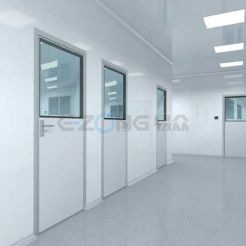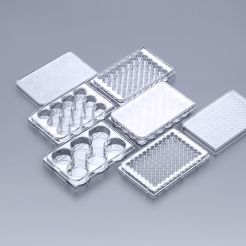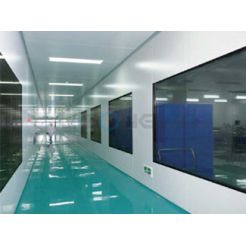Pharmaceutical BFS Machine
Blow-Fill-Seal (BFS) is a highly automated and efficient packaging technology used primarily in the pharmaceutical, food, and cosmetic industries. The BFS machine integrates three essential processes into one continuous operation: blowing, filling, and sealing plastic containers.
Product Description
Specifications and Technical Parameters:

1.1 Introduction to BFS (Blow-Fill-Seal) Machine:
Blow-Fill-Seal (BFS) is a highly automated and efficient packaging technology used primarily in the pharmaceutical, food, and cosmetic industries. The BFS machine integrates three essential processes into one continuous operation: blowing, filling, and sealing plastic containers. This results in the production of single-dose, aseptic containers with minimal human intervention, making it a popular choice for packaging sterile pharmaceuticals and healthcare products.
1.2 Key Functions of a BFS Machine:
Blowing: The BFS process starts with the creation of a plastic container. Plastic granules are melted and formed into a mold to create the desired container shape. This step involves the use of a parison (a tube-like plastic structure) that is blown into the mold cavity using sterile compressed air. This forms the container, and the excess plastic is trimmed off.
Filling: After the container is formed, it is transported to the filling station. Here, the product to be packaged (e.g., liquid medications, eye drops, or saline solutions) is precisely measured and injected into each container. The filling process is done in a sterile environment to ensure product integrity.
Sealing: Once the containers are filled, the BFS machine seals them. A sterile plastic cap or closure is applied to the container, forming an airtight seal. This sealing process prevents contamination and ensures the product's shelf stability and sterility.
Aseptic Processing: One of the primary advantages of BFS technology is its ability to produce aseptic packaging. The entire process is conducted in a controlled, sterile environment, minimizing the risk of microbial contamination. This is crucial for pharmaceutical products where sterility is a top priority.
High Throughput: BFS machines are known for their high production speeds and efficiency. They can produce a large number of containers per minute, making them ideal for mass production of small-dose pharmaceuticals.
Customization: BFS machines can be customized to produce containers of various shapes and sizes, making them versatile for different product packaging needs.
Quality Control: These machines often incorporate quality control measures, such as vision systems and weight checks, to ensure that each container is filled accurately and sealed properly.
2 Key Components
Material Feeding System:
● Plastic Resin Hopper: This component stores the raw plastic resin or granules used to create the containers.
● Conveyor System: It transports the plastic resin from the hopper to the BFS machine for melting and molding.
Blowing Station:
● Extruder: The extruder melts the plastic resin and forms it into a continuous tube-like structure called a parison.
●Parison Cutter: This cuts the parison into individual sections, each of which will become a container.
● Mold Cavity: The mold cavity shapes the parison into the desired container shape using sterile compressed air.
Filling Station:
● Filling Nozzles: These precision nozzles inject the product (e.g., liquid pharmaceuticals) into the containers.
● Dosage Control: Systems for accurately measuring and controlling the volume of product filled into each container.
● Sterile Environment: The filling station is maintained under sterile conditions to ensure product integrity.
Sealing Station:
● Closure Applicator: This places sterile plastic caps or closures onto the filled containers.
● Heat Sealing: The closures are heat-sealed onto the containers to create an airtight seal.
● Cooling System: Containers may be cooled to ensure proper sealing.
Transport System:
● Conveyor Belts: These transport the containers between the different stations of the BFS machine.
● Sterile Environment: The entire transport system is designed to maintain a sterile environment to prevent contamination.
Control System:
● PLC (Programmable Logic Controller): The BFS machine is controlled by a PLC, which manages the machine's operations and sequences.
● HMI (Human-Machine Interface): Operators use an HMI to set parameters, monitor the machine's performance, and troubleshoot issues.
Quality Control and Inspection:
● Vision Systems: Cameras and sensors may be used for quality control, including checking for proper filling levels and seal integrity.
● Weight Checking: Systems to verify that each container has the correct weight of product.
Sterilization and Aseptic Environment:
● Laminar Airflow: BFS machines often have laminar airflow systems to maintain a clean, sterile environment.
● Sterilization Processes: Various sterilization methods are employed to ensure the cleanliness of the equipment and the product.
Cleaning and Maintenance Systems:
● CIP (Clean-in-Place) and SIP (Sterilize-in-Place) Systems: These systems are used to clean and sterilize the machine between production runs.
● Maintenance Access: The machine is designed for easy access to components for maintenance and cleaning.
Safety Features:
● Safety Guards and Interlocks: These ensure operator safety by preventing access to moving parts during operation.
● Emergency Stop: A safety system that can halt the machine in case of emergencies.
Data Recording and Reporting:
● Data Logging: Recording data related to production parameters and quality control.
● Reporting System: Generating reports on machine performance and production metrics.
3 Usage Scope:
Pharmaceuticals:
BFS is extensively used in the pharmaceutical industry to produce sterile unit-dose containers for liquid and semi-liquid medications. This includes products such as eye drops, nasal sprays, oral solutions, and injectable drugs.
BFS is ideal for pharmaceuticals because it ensures product sterility, accurate dosing, and protection from contamination.
Cosmetics and Personal Care Products:
Cosmetics, such as skincare creams, lotions, and shampoos, often come in small, single-use containers produced using BFS technology.
The aseptic packaging ensures product integrity, and the containers can be designed to dispense the right amount of product.
Healthcare Products:
BFS machines are used to package various healthcare products, including contact lens solutions, wound care products, and oral hygiene solutions.
Veterinary Medications:
Veterinary medicines, such as eye drops and antibiotics for animals, can also be packaged using BFS to ensure sterility and accurate dosing.
Chemicals and Industrial Products:
Some BFS machines are used in the chemical and industrial sectors to package small quantities of specialized chemicals or fluids.
Hospital and Healthcare Facilities:
BFS technology is employed in hospital and healthcare settings to produce sterile unit-dose containers for patient use, such as saline solutions, wound care products, and ophthalmic solutions.
Clinical Trials and Research:
BFS is valuable in clinical trials and research applications, where precise dosing and sterility are critical for testing new medications and therapies.
Emergency and Disaster Relief:
In emergency and disaster relief situations, BFS can be used to produce sterile, single-dose medical supplies for quick deployment.
4 Usage Guidelines:
Operator Training and Qualification: Ensure that operators are adequately trained and qualified to operate BFS machines. Training should cover machine operation, maintenance, safety protocols, and aseptic techniques.
Hygiene and Sterility: Maintain a sterile environment throughout the BFS process. Operators should wear appropriate sterile clothing and follow strict hygiene practices to prevent contamination. Regularly validate and monitor the sterilization processes within the machine, such as steam sterilization or hydrogen peroxide vapor sterilization.
Material Handling: Store plastic resin and other materials in clean, controlled environments to prevent contamination.Ensure that only approved and tested materials are used in the BFS process, including plastic resins, closures, and product formulations.
Machine Validation: Regularly validate the BFS machine's performance to ensure it meets quality and regulatory requirements. Perform installation qualification (IQ), operational qualification (OQ), and performance qualification (PQ) as part of validation protocols.
Cleaning and Sanitization: Establish and follow strict cleaning and sanitization procedures between production runs.Implement Clean-in-Place (CIP) and Sterilize-in-Place (SIP) systems to clean and sterilize machine components.
Product Validation: Validate the BFS process for each product to ensure it meets quality standards and regulatory requirements.
Conduct stability studies to determine the product's shelf life and compatibility with BFS packaging.
Quality Control and Inspection: Implement quality control measures such as vision systems, weight checks, and fill level inspections to ensure product quality and consistency.Establish protocols for rejecting containers that do not meet quality standards.
Record Keeping: Maintain detailed records of production runs, quality control data, and equipment maintenance. These records are essential for traceability, quality assurance, and regulatory compliance.
Regulatory Compliance:Stay updated with industry regulations and standards, such as Good Manufacturing Practices (GMP), Current Good Manufacturing Practices (cGMP), and relevant guidelines from regulatory authorities like the FDA or EMA. Ensure that the BFS machine and processes comply with these regulations and standards.
Emergency Procedures: Develop and communicate emergency procedures for equipment failures, contamination incidents, or other critical situations.
Have backup plans and resources available to minimize production downtime during emergencies.
Maintenance and Preventive Maintenance: Implement a robust preventive maintenance program to keep the BFS machine in optimal working condition.
Regularly inspect and maintain machine components to prevent breakdowns and ensure consistent performance.
Operator Safety: Prioritize operator safety by providing protective equipment, safety training, and clear operating procedures. Ensure that emergency stop buttons and safety interlocks are functioning correctly.
Environmental Considerations: Comply with environmental regulations regarding waste disposal, recycling, and the handling of chemicals or materials used in the BFS process.
5 Why Choose Us:
Pharmaceutical-Grade Purity:
Our BFS Machine is manufactured using pharmaceutical grade stainless steel and high efficiency purification processes, ensuring it delivers high purity and meets the hygiene and quality standards essential for pharmaceutical and medical facilities
Strict Manufacturing Processes and Quality Control:
We follow strict manufacturing processes and quality checks. Every generator undergoes thorough testing and inspection before it's shipped to ensure it provides a stable supply of steam during continuous operations. This reduces the risk of steam quality related issues in pharmaceutical production
Deployment of Experienced Engineers to Customer Facilities:
We dispatch experienced engineers to our customers' facilities. During the installation process, they supervise the equipment installation, ensuring that every component is correctly and accurately configured. Additionally, they provide detailed operating instructions to ensure customers can fully utilize the equipment's capabilities for efficient production.
Over 10 Years of Project Experience:
With over 10 years of successful project experience providing water purification solutions to the pharmaceutical industry,Our expertise and experience serve as strong support for the success of your projects.
6 Payment Terms:
30% advance payment upon contract signing, with the remaining 70% to be settled before shipment
Email: info@everhealgroup.com
Mob.: +86 188 5843 2776
Tel.: +86 188 5843 2776
WeChat: +86 188 5843 2776
Whatsapp: +8618858432776
Add.: No. 5, Jinhai Avenue, Dongchen Binhai Industrial Zone, Xiangshan County, Ningbo City, Zhejiang Province








